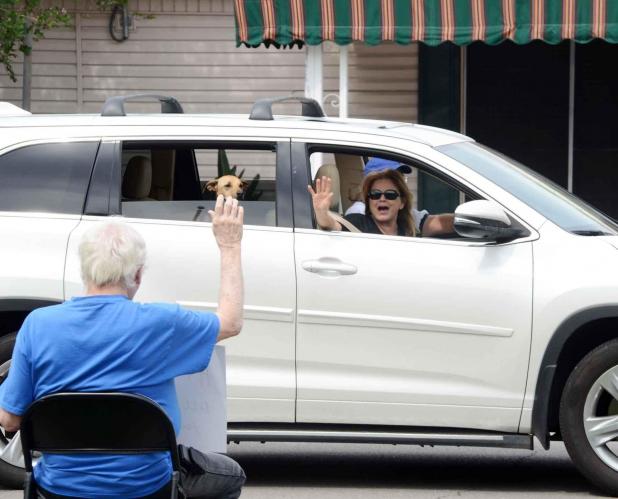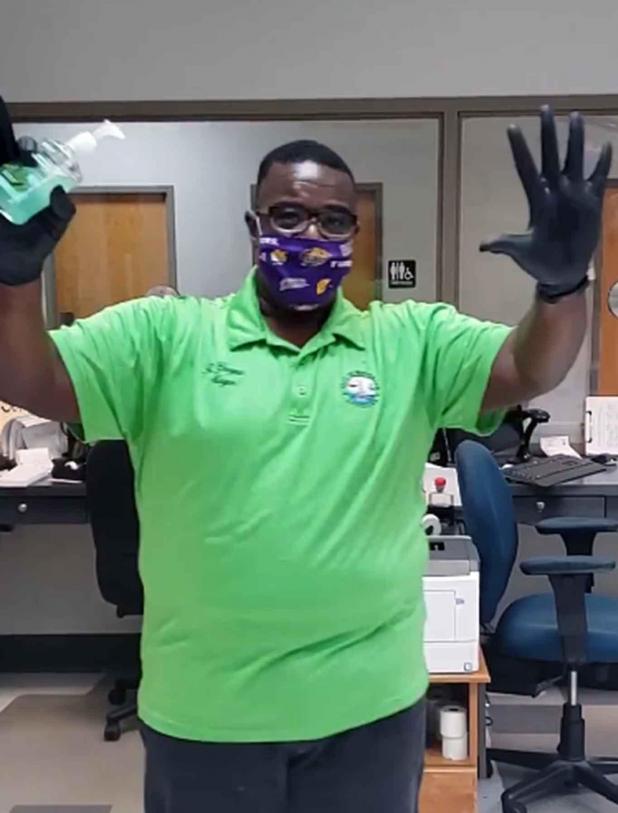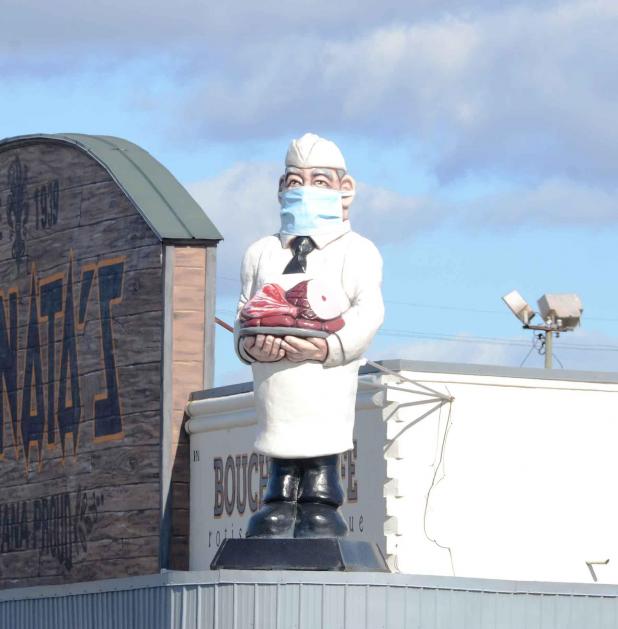


Top Photo: After visitation was forbidden at nursing homes and assisted living centers, facilities including Maison Jardin in Morgan City turned to drive-by visits. Middle Photo: Patterson Mayor Rodney Grogan was among the local officials who made a music video to encourage people to use masks and sanitizer. Bottom Photo: Even the butcher statue atop Cannata's Market in Morgan City donned a mask.
From the Editor: Saturday marks anniversary of the day coronavirus restrictions came down
You don’t need anyone to tell you what the last year has been like. It was the year of COVID-19.
But what will the next year bring?
Tuesday was the anniversary of the day that the first COVID-19 case was detected. Saturday marks a year since the hammer came down.
Gov. John Bel Edwards signed a stay at home order, closed schools until they could put together virtual learning programs, closed nonessential businesses and limited the number of customers in essential ones.
Hospitals filled rapidly with COVID patients, leaving little room for elective procedures. Those delays created other health problems.
You couldn’t visit hospital patients for fear of spreading the virus. People in nursing homes, which were especially hard hit, were also denied the chance to see friends and relatives.
We’ve been asked to wear surgical masks as a matter of routine. We learned that one stanza of “Happy Birthday” takes about as long as we should be washing our hands.
Live music all but went away. Big occasions, like the Louisiana Shrimp & Petroleum Festival, were canceled for a year.
People were laid off from businesses that had no work or were closed. Unemployment in St. Mary rose to 14.9% last spring.
Many mitigation measures have been removed or relaxed. But even the strongest measures imposed to fight a pandemic in 100 years never seemed to be enough.
World War II killed about 419,000 American troops 1941-45. COVID-19 killed that many Americans in 10 months. The total is now over 527,000, according to the Centers for Disease Control and Prevention.
In St. Mary, St. Martin and Assumption parishes, with a combined population of about 130,000, 11,228 COVID confirmed or probable COVID-19 cases had been recorded as of Thursday. The number of COVID-related deaths as of Thursday was 271, according to the Louisiana Office of Public Health.
Now we have hope. Louisiana moved into Phase 3 of coronavirus restrictions last week, so most businesses will be able to welcome more customers. Bars and live music are back.
The Trump administration’s Operation Warp Speed for vaccine development performed a miracle, leading to the creation of three safe vaccines so far. The plans for distribution were something less than miraculous. Even so, President Joe Biden said Thursday that supplies should be adequate to inoculate everyone by May.
But, while we can hope that the virus will go away this year, the effects of this plague year will be around for a while:
—Economically, we’ll have to hope that federal cash can give us time to regroup. A lot of money is flowing: two rounds of stimulus checks with another coming, $80 million in Paycheck Protection Program loans in St. Mary alone, plus $600 and $300 federal contributions to weekly unemployment benefits.
That’s on top of millions coming into the parish aside from COVID relief: $80 million for the Bayou Chene flood project, $19 million for the Wellness Center at Franklin Foundation Hospital and $11 million for the Bayou Teche flood project, which is receiv-ing its finishing touches.
—Federal COVID aid will soon total $6 tril-lion on top of historic levels of federal debt.
In 2011, according to the U.S. Treasury, the national debt was about $14 trillion. A decade later, it’s at $27 trillion, about $7 trillion more than U.S. gross domestic product.
Democrats in Congress say it’s time to go big. Republicans say the massive spending can lead to something we haven’t had to worry about in 40 years: inflation.
We’re about to find out who’s right.
—The power of the governor to impose public safety and economic restrictions to fight an epidemic has become controversial. Edwards has been accused of creating a “shutdown culture” that hurts Louisiana’s economy.
So far, Edwards’ pandemic proclamations have withstood challenges in the courts and the Legislature. The rational thing to do, once we’re no longer under pressure from a raging pandemic, would be to codify the governor’s emergency powers and their limits.
But we won’t.
—Virtual learning may not go away when COVID goes away. While it won’t replace on-campus learning, remote schooling does offer opportunities for homebound students, and it might allow young people to pursue a college education while holding down a job.
—Many newspapers are learning they can downsize their office space because reporters and editors can work remotely. How many other businesses will reduce their costs by turning their offices into a virtual community?
—Masks may be part of future beyond COVID. Now that we — many of us, anyway — have learned the value of masks, we may decide we should use them during other high-risk times, such as flu season.
—Our views have changed when it comes to who is essential to our economy and who isn’t.
No one would argue about the value of doctors, nurses and EMTs. But we’ve found new respect for the kid who stocks grocery shelves, the people who change the sheets on hospital beds and thou-sands of others.
We’ve learned a lot in the last year. Most of all, we learned something about ourselves and our country.
We got sucker-punched, but we got up off the mat.
Bill Decker is managing editor of The Daily Review.
